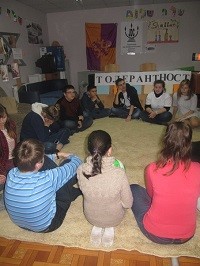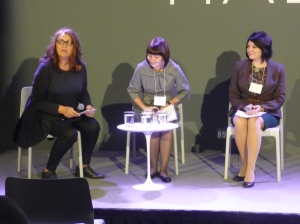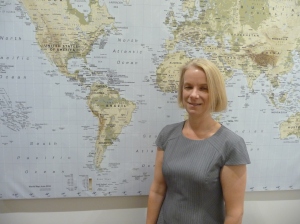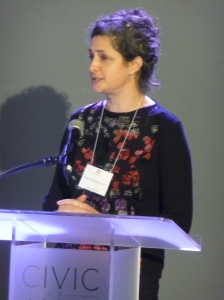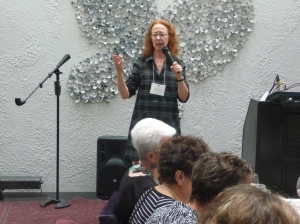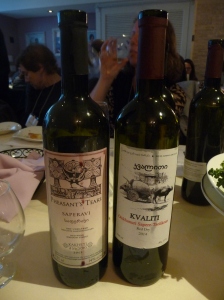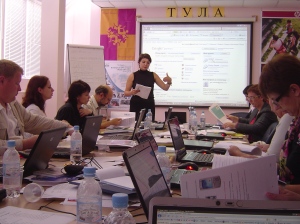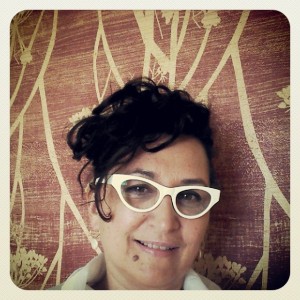This article was originally published in eJewish Philanthropy on May 23, 2014 and is being reposted here.
“In Ukraine, the Message is “To Think Positively” by Karyn Grossman Gershon.
“I have always said prayers of peace for Israel.
It is strange to be saying Jewish prayers of peace for Ukraine.”
“Yesterday there were shots in Donetsk (it’s next to me).”
“There were roadblocks along all our way home from my daughter’s.
They stopped cars, checking the trunks.”
“In Slovyansk people don’t leave their apartments without urgent need.
All the stores are closed.”
“Yesterday, a military campaign started here … ”
“For days already the Donetsk region is in a state of panic. Social networks spread information that all tap water has been poisoned, and soon there will be no water at all. All bottled water was immediately bought up in the stores and all empty containers in the apartments have been filled with water. People do not trust anyone.”
“Here we have trenches and tanks, and we are worried about our future.
Who can help us?”
“I have a go-pack ready at home.
This is a very uncertain situation, and people have no confidence in the future.”
For 25 years, throughout Russia, Ukraine, Belarus, Moldova, Georgia and Kazakhstan, and most recently in Israel, Project Kesher has been transforming women’s lives, restoring their Jewish identity and providing training in leadership and social activism. United by shared values, this network of thousands of Jewish women has been steadily building Jewish community and civil society. Engaging women of other ethnicities and religions in the region, they’ve build coalitions to address common issues around women’s health and safety.
Now that network is being tested as the conflict in Ukraine raises fears and sows mistrust.
Project Kesher in the U.S. hears from its activists in the region every day. At the beginning of the conflict even Jews who have been bound by common goals and friendships across borders retreated to various political corners, reflecting what they heard on TV and expressing their local anxieties. They reported things like:
“We [women in Russia and Ukraine] continue to communicate
but the moment we start discussing politics conflicts arise.”
[Within Ukraine itself] “I don’t want to communicate with those who support a split
in the country.”
“We stand for the unity of Ukraine unlike those who want to destroy the country.”
“The propaganda war often makes people feel scared,
it’s hard to see between truth and lie.”
“There are many provocateurs in social networks.
Many people post negative information, thus escalating the tension.”
“Some Jewish organizations became alienated due to differing attitudes.”
Initially, Jewish women in the Project Kesher network, on different sides of the border, expressed anger at each other about the conflict. Women in Ukraine, many who had been active in the Euromaidan protests, were angry that Russian women did not defend their right to affiliate with Europe. Some women in Russia believed that parts of Ukraine were historically Russian and, if the population wanted to rejoin Russia, they should be allowed to do so. Others, pounded by government propaganda 24/7, began to believe that widespread anti-Semitism was a legitimate threat.
Then something interesting began happening, community by community. Unlike in cold war days, of course, people have unfettered access to communication. These Jewish women are in relationship with each other, on both sides of the conflict, and with Project Kesher staff and supporters in the U.S. They have had years to build personal relationships across borders and across ethnicities. Now, by email, social networks, Skype, and phone, they took a step back and, bypassing the slanted media reports, began to share information about what each was hearing from her government and media and how it differed from what they were seeing in their own communities. Internal tensions among them subsided as they realized that they needed to take concrete actions to help re-stabilize the region… and that they were trained to do just that.
So even as the situation escalated – and although their political stances still differed – the women of Project Kesher continued to meet up, beginning with the global seders they had already been planning. For example, the 12 Project Kesher women’s groups in Crimea went on working uninterrupted and without judgment as to whether their region should be Russian, Ukrainian or independent. Throughout Ukraine, PK leaders conducted workshops, and organized circles of diverse people seeking peaceful solutions. Under growing economic pressures, facing lower salaries and inflated prices of food, goods, and medicines – and now subjected to restriction of movement due to the violence – they committed to holding a space for dialogue and community-building.
[From Russia:] “ It’s time to stop. I trust my friends and relatives living in Ukraine.”
“The political situation has changed relationships between many people,
many have absolutely opposite points of view,
yet we continue to communicate, look for compromise,
or at least avoid discussing politics.”
“Friends from other regions are calling and writing,
offering help and shelter for our women.
All of us are united by one thing –
the desire that peace will come as soon as possible.”
Jewish women in Belarus, Georgia, Russia and Ukraine who had been at the forefront of coalition-building in their region found, ironically, that their skills were now being called upon to facilitate dialogue between people in Russia and Ukraine and between Ukrainians of differing political affiliations.
This work is ongoing today. While Jewish women share the frustration and fears of others in their region, many are trying to regain some control over their quality of life through the framework of their Jewish identity and the social activism skills they have developed in the past decade.
Jewish women in Belarus, Russia and Ukraine realize that they do not have the ability to force the governments to be less aggressive but they do have the power to create public sentiment for restraint, diplomacy and ultimately, peace.
On their websites, Project Kesher activists have been posting ideas to promote a peaceful resolution.
In their roles as community leaders, teachers, social workers, etc., Project Kesher women continue to convene and to facilitate community dialogues on tolerance. They have been reaching out to youth groups, college students and community leaders to organize community roundtables to discuss the situation.
And now, increasingly more people across faiths, ethnicities, and cultures are joining their neighbors who were already engaged in these circles of dialogue. One thing they all express – from Kiev, Moscow, Crimea, eastern Ukraine – is that, whatever the political leaders are saying, they do not want to go to war.
We believe that this message is missing from the media.
As the conflict escalates, Jewish women in the Project Kesher network have begun to ask for support to learn mediation and constructive conflict skills to facilitate dialogue across borders. They are searching for opportunities to bring together leaders at neutral sites to strategize about how Jewish women can help stabilize Ukraine and Russia and continue to make strides in advocating for women and girls.
Galya, from Eastern Ukraine, writes, “Our only chance to stay sane under such circumstances is to do what actually Project Kesher has been doing for years – to network, to share information, to support those who are emotionally exhausted, to believe in ourselves, to think positively, and to act.”
– See more at: http://ejewishphilanthropy.com/in-ukraine-the-message-is-to-think-positively/#sthash.B8Vc1YUf.dpuf


